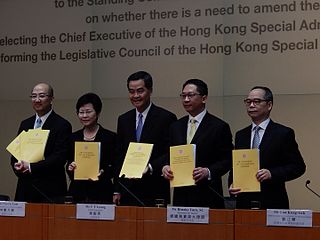
A popular initiative is a form of direct democracy by which a petition meeting certain hurdles can force a legal procedure on a proposition.

The National Assembly was the authoritative legislative body of the Republic of China, from 1947 to 2005. Along with the Control Yuan and the Legislative Yuan, the National Assembly formed the tricameral parliament of the Republic of China.
A constitutional amendment is a modification of the constitution of a polity, organization or other type of entity. Amendments are often interwoven into the relevant sections of an existing constitution, directly altering the text. Conversely, they can be appended to the constitution as supplemental additions, thus changing the frame of government without altering the existing text of the document.

The Senate is the upper house of the States General, the legislature of the Netherlands. Its 75 members are elected on lists by the members of the twelve States-Provincial and four electoral colleges for the Senate every four years, within three months of the provincial elections. All provinces and colleges have different electoral weight depending on their population.
A supermajority is a requirement for a proposal to gain a specified level of support which is greater than the threshold of one-half used for a simple majority. Supermajority rules in a democracy can help to prevent a majority from eroding fundamental rights of a minority, but can also hamper efforts to respond to problems and encourage corrupt compromises at times when action is taken. Changes to constitutions, especially those with entrenched clauses, commonly require supermajority support in a legislature. Parliamentary procedure requires that any action of a deliberative assembly that may alter the rights of a minority have a supermajority requirement, such as a two-thirds vote. In consensus democracy the supermajority rule is applied in most cases.
In the politics of the United States, the process of initiatives and referendums allow citizens of many U.S. states to place legislation on the ballot for a referendum or popular vote, either enacting new legislation, or voting down existing legislation. Citizens, or an organization, might start a popular initiative to gather a predetermined number of signatures to qualify the measure for the ballot. The measure is placed on the ballot for the referendum, or actual vote.

The Australian republic referendum held on 6 November 1999 was a two-question referendum to amend the Constitution of Australia. The first question asked whether Australia should become a republic, under a bi-partisan appointment model where the president would be appointed by the federal parliament with a two-thirds majority. This was the model that was endorsed by the Constitutional Convention, held in Canberra in February 1998. The second question, generally deemed to be far less important politically, asked whether Australia should alter the Constitution to insert a preamble.

Legislative elections are held in Hong Kong every four years Legislative Council (LegCo) in accordance with Article 69 of the Basic Law. Legislative elections are held either at the expiry of a four-year term or when the Chief Executive dissolves the legislature and calls a new election.

The European Union adopts legislation through a variety of legislative procedures. The procedure used for a given legislative proposal depends on the policy area in question. Most legislation needs to be proposed by the European Commission and approved by the Council of the European Union and European Parliament to become law.

Referendums are held only occasionally by the Government of New Zealand. Referendums may be government-initiated or held in accordance with the Electoral Act 1993 or the Citizens Initiated Referenda Act 1993. Nineteen referendums have been held so far ; fourteen were government-led, and five were indicative citizen initiatives.
Bills have been introduced in the US Congress on several occasions to amend the US Constitution to abolish or to reduce the power of the Electoral College and to provide for the direct popular election of the US president and vice president.

Democratic reforms in Hong Kong did not seriously begin until 1984 and has faced significant challenges since 2014. The one country, two systems principle allows Hong Kong to enjoy high autonomy in all areas besides foreign relations and defence, which are responsibilities of the central government. Hong Kong's Basic Law allows residents to vote for local district councillors.
Direct democracy refers to decision making or direct vote a proposal, law, or political issue by the electorate, rather than being voted on by representatives in a state or local legislature or council.

The 1994 Hong Kong electoral reform was a set of significant constitutional changes in the last years of British colonial rule in Hong Kong before the handover of its sovereignty to the People's Republic of China (PRC) on 1 July 1997. The reform aimed at broadening the electorate base of the three-tiers elections in 1994 and 1995, namely the 1994 District Board elections, the 1995 Urban and Regional Council elections and the 1995 Legislative Council election. It was the flagship policy of the last colonial governor Chris Patten.

The 2014–2015 Hong Kong electoral reform was a proposed reform for the 2017 Hong Kong Chief Executive election and 2016 Legislative Council election.

The constitution of the French Fifth Republic allows three types of referendum:
- At the national level, a legislative referendum on the initiative of President of the French Republic on a proposal by the Cabinet or the Parliament ;
- Locally, a local referendum initiative.
- The Constitutional Law of 23 July 2008 provides a shared initiative referendum.
The 2005 Hong Kong electoral reform was carried out in late 2005 for the selection of the Chief Executive of Hong Kong (CE) in 2007 and Legislative Council of Hong Kong (LegCo) in 2008. The reform proposals were ultimately voted down by the pro-democracy camp.
Liberalism in Hong Kong has become the driving force of the democratic movement since the 1980s which is mainly represented by the pro-democracy camp which strives for the universal suffrage, human rights and rule of law in Hong Kong. It is one of two major political ideologies of the Hong Kong, with the other being conservatism. The emergence of the contemporary liberalism took root in the rapid democratisation in the final years of the colonial years in the 1980s and 1990s, which the pro-democracy camp was united under the banner of an autonomous Hong Kong under Chinese sovereignty. The liberals consolidated their popular support from the 1989 Tiananmen Square protests and massacre and received landslide victories in the first direct elections in 1991 and 1995 in the final colonial years. The liberals took the defensive role against the Beijing's authoritarian regime going into the early SAR period which led to the massive demonstration against the Basic Law Article 23 in 2003.
The United States Electoral College was established by the U.S. Constitution, which was adopted in 1789, as part of the process for the indirect election of the President and Vice-President of the United States. The institution is criticized since its establishment and a number of efforts have been made to reform the way it works or abolish it. Any change would require a constitutional amendment. In 1971, one of these attempts was almost successful in being proposed to the States. An interstate compact proposal, which would bypass the requirement for a constitutional amendment, is at 76% of successful completion as of August 2023.











